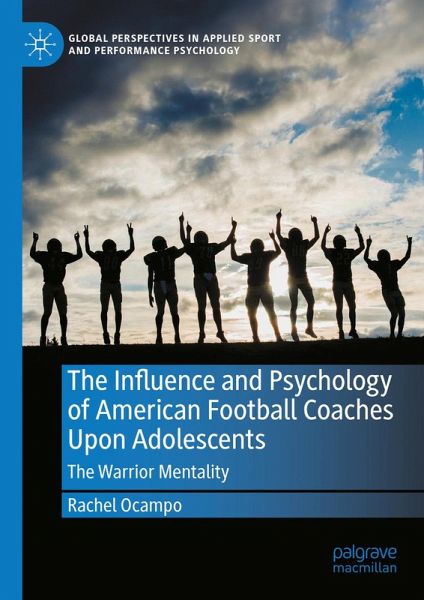
The Influence and Psychology of American Football Coaches Upon Adolescents (eBook, PDF)
The Warrior Mentality
Versandkostenfrei!
Sofort per Download lieferbar
104,95 €
inkl. MwSt.
Weitere Ausgaben:

PAYBACK Punkte
52 °P sammeln!
This book details the psychological theory and research surrounding various aspects of coaching, with a specific focus on American football coaches' work with young people. These theories are explained using coaches' personal stories and the clinical insights of the author: a former athlete, sport psychology professor, and licensed psychologist. This book explores the psychological minutiae of effective coaching relationships, avenues toward expanding notions of traditional masculinity, ethnic and racial minority worldviews and experiences in sport, ways to more effectively engage gender and s...
This book details the psychological theory and research surrounding various aspects of coaching, with a specific focus on American football coaches' work with young people. These theories are explained using coaches' personal stories and the clinical insights of the author: a former athlete, sport psychology professor, and licensed psychologist. This book explores the psychological minutiae of effective coaching relationships, avenues toward expanding notions of traditional masculinity, ethnic and racial minority worldviews and experiences in sport, ways to more effectively engage gender and sexual minority athletes and players living in poverty, strategies to meet the needs of neurodiverse and physically or intellectually challenged players, recommendations for balancing coaches' role strain, and ways to weather mental health challenges surrounding grief and loss on and off the field.
In addition, this book also infuses global perspectives on applied sport psychology in its focus on American football coaches from immigrant, indigenous, and non-Western backgrounds. Experiences of these coaches will be explored to better understand specific struggles, strengths, and contributions of these communities to the field of sport psychology.
In addition, this book also infuses global perspectives on applied sport psychology in its focus on American football coaches from immigrant, indigenous, and non-Western backgrounds. Experiences of these coaches will be explored to better understand specific struggles, strengths, and contributions of these communities to the field of sport psychology.
Dieser Download kann aus rechtlichen Gründen nur mit Rechnungsadresse in A, B, BG, CY, CZ, D, DK, EW, E, FIN, F, GR, HR, H, IRL, I, LT, L, LR, M, NL, PL, P, R, S, SLO, SK ausgeliefert werden.












